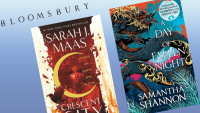
How sci-fi writer JG Ballard's computer poems predicted ChatGPT
bbc.com – Saturday May 11, 2024

In the 1970s, science fiction writer JG Ballard was intrigued by the growing capabilities of computers – so used one to compose poems. They were a first step on the road to ChatGPT.
The novelist and short story writer JG Ballard, is known for conjuring warped and reimagined versions of the world he occupied. Dealing with strange exaggerations of realities and often detailing the breakdown of social norms, his unconventional works are hard to categorise.
Sitting on the edge of reality, these unsettling visions often provoked controversy. Eschewing a science-fiction of the distant future, Ballard described his own work as being set in "a kind of visionary present".
Today, as we contemplate generative AI writing texts, composing music and creating art, Ballard's visionary present yet again has something prescient and fresh to tell us.
In an interview from 2004, the author Vanora Bennett suggested to Ballard that he writes about "what is just about to happen in a given community". Asked about what "kind of real-life event" inspired the ideas in his fiction Ballard responded:
I just have a feeling in my bones: there's something odd going on, and I explore that by writing a novel, by trying to find the unconscious logic that runs below the surface and looking for the hidden wiring. It's as if there are all these strange lights, and I'm looking for the wiring and the fuse box.
The topics in Ballard's fiction frequently reveal just how highly attuned he was to the subtleties of the emerging technological and social shifts that were, as he puts it, just below the surface. The fuse box of society was often rewired in his ideas.
And with generative AI there is undoubtedly something odd going on, to which Ballard's attention seems to have been drawn long before it even happened.

UK audiobook downloads up 17% last year, Publishers Association data shows
theguardian.com – Wednesday May 8, 2024

The number of UK audiobook downloads increased by 17% between 2022 and 2023, according to new data from the Publishers Association (PA).
Revenue from audiobooks rose 24% across the same period to £206m in 2023, reflecting an increase in the number of audiobook downloads from 50m to 59m, the trade body said.
Over five years, UK audiobook revenue has more than doubled. “It’s fair to say that audio is now a really serious part of the publishing portfolio,” said the PA’s chief executive, Dan Conway. “Audiobooks have established themselves as a major route to market for consumers of books in this country”.
These figures reflect the way the audiobook market has evolved. Spotify made audiobooks available to its Premium subscribers in October, while Audible has expanded from single-narrator audiobooks to those with large, starry casts and sound effects. Sam Mendes-produced audiobooks of David Copperfield and Oliver Twist featuring Ncuti Gatwa, Helena Bonham Carter and Nicola Coughlan were released in the past two years, and there are plans to release new audiobooks of all seven Harry Potter titles, voiced by a cast of more than 100 performers.

BookTok’s influence on publishing is set to last
ft.com – Tuesday May 7, 2024

The bursting of the pandemic sales bubble has been sharp and painful for sectors such as online retail. In publishing, an unlikely source — social media — has helped avoid a hard landing.
Social media should, in theory, be an enemy of the publishing industry given the competing pressures on consumers’ time. Since the pandemic, though, it has produced growth for once-niche genres such as fantasy and propelled authors who were little known to mainstream audiences on to bestseller lists. This will not be a fleeting phenomenon.
BookTok is a community within the video app TikTok in which influencers post content such as reviews of their favourite books. Similar groups can be found on YouTube or Instagram. Yet it is BookTok that has shaken up the sometimes fusty literary world, turbocharging sales of authors such as Sarah J Maas, Colleen Hoover and Alice Oseman among younger readers.

New to Your Public Persona? Handling the Non-Writing Parts of Being an Author
sfwa.org – Tuesday May 7, 2024

Who are you?
No, not in a “name, rank, and serial number” kind of way or the physical parts on display. Not the broad character traits you associate with yourself, either. It’s a complicated question, right? It can be hard to define, even to yourself, much less others. In fact, just about everyone you’ve interacted with has probably seen you as a slightly different person than everyone else has.
This isn’t a bad thing, far from it. Who you are to a specific person or group, your persona, or a tailored version of your personality can be a powerful tool.
You’re more than what you seem
When interacting with the public, be it fans, casual readers, haters, publishers, editors, or whoever, you will be acting as a version of yourself, whether you know it or not. Being aware of this allows polishing this version to be more effective for the type of interaction taking place.

Workshop: Editing point of view in fiction and narrative non-fiction
artshub.com.au – Saturday May 4, 2024

This two-part online workshop will consider the question of point of view in both fiction and narrative non-fiction from an editor’s perspective. We will look closely at narrative voice — first, second and third person — and weigh up the effectiveness and limitations of each and how to communicate this to writers.
The workshop will explore perplexities such as:
- What are the benefits of a first person narrative? Equally, what are the constraints and potential pitfalls of this voice?
- When is a third person voice most effective; and what are the traps to look out for here?
- Is omniscience ever truly omniscient?
We will also look at narrative vantage point and ask: From where is the story being told? And how does the narrator’s vantage point affect the emotional tone and direction of the narrative (particularly for memoir editing).
Finally, we will flip point of view to that of the reader and ask: who is listening? Is the reader being treated as an insider or an outsider to the world being portrayed? And how does this influence the writing?
This session will be delivered online using Zoom. There are two parts to the course and it is necessary to attend both sessions.

Channel 4 seeks Northern TV writers
prolificnorth.co.uk – Tuesday April 30, 2024

The Channel 4 Writing for Television Awards and Channel 4 Northern Talent Network: Script Hubs are both open for entry until June 4, 2024.
The awards offer new television writers based in the North of England unique opportunities with independent production companies Bonafide Films (Mood, The Last Post), Rollem Productions (Love Lies & Records, Girlfriends) and Red Production Company (It’s a Sin, Happy Valley), which rejoins the programme in 2024 having been one of the inaugural production company partners when the awards were launched in 2014.

The State of the Crime Novel, Part 1: Writing Life
crimereads.com – Tuesday April 30, 2024

Once again, the Edgar Awards are upon us, and once again, I’ve had the privilege of asking dozens of great writers to contribute to our annual roundtable discussion on the state of the genre. This year’s roundtable, like in previous years, is divided into two parts: the first, running today, is focused on craft advice and the writing life, while the second, running tomorrow, will address issues in the genre and the future of crime writing. Thanks so much to the more than 30 nominees who sent in thoughtful, fascinating, and often hilarious responses. The award ceremony is this Wednesday night, and you’ll be able to follow along on social media as winners are announced or take a look at CrimeReads first thing on Thursday morning.
WHAT IS YOUR ADVICE FOR WRITERS WHO ARE JUST STARTING OUT? AND WHAT’S THE BEST PIECE OF WRITING ADVICE YOU’VE EVER GOTTEN?
William Kent Krueger (nominated for Best Novel – The River We Remember): First piece of advice: Write every day, and write because you love it, not because you hope you’ll get rich and famous from the effort. Second piece of advice: Marry someone with a good job.
The best piece of advice given to me when I was about to become a published author was to get to know the booksellers. If the booksellers like you and appreciate your work, they’ll sell you like crazy and spread the word. I found this to be true.

A new start after 60: after a decade of rejections, I got my first novel published. Now I’ve got my dream, I won’t stop!
theguardian.com – Tuesday April 30, 2024

After a successful career as a talent agent – representing Michael Parkinson, Ulrika Jonsson and Adam Ant – Melanie Cantor became disillusioned with TV. So she took up writing – and refused to give up on her passion.
At 61, after a decade writing four unpublished manuscripts and receiving hundreds of rejections from agents and publishers, Melanie Cantor got an email in 2019 from the literary agent Felicity Blunt. “It started off positively and I was just waiting for the ‘but’ to arrive, but it never did,” Cantor says. “She said she wanted to represent me.”
In 2020, Dorset-based Cantor’s debut novel Life and Other Happy Endings, about a woman with three months to live who spends her remaining time writing letters to those who have wronged her, came out. Its publication was the culmination of a lifelong fascination with writing.
“My father was an artist and even though I couldn’t draw for toffee, words were my creativity,” she says. “I used to write stories and poetry. When I was given a guitar at 15, I even wrote songs. I never thought being a writer was possible, though, since the only option if you were good at English in the 60s was to become a teacher.”
Rather than work in education, Cantor became a secretary for the theatre publicist Peter Thompson and developed her own roster of clients. In the 90s, she made the switch to talent management, founding her own agency that represented everyone from Michael Parkinson to Ulrika Jonsson and Adam Ant. Yet by 2008, she was becoming disillusioned and decided to take a new direction.

The one-man-band literary review that’s outpacing the monthly magazines
inews.co.uk – Tuesday April 30, 2024

Ed Needham edits and publishes Strong Words almost singlehandedly from a room in his west London home
Strong Words is an extraordinary magazine about books. Each edition runs to 84 pages and 45,000 words, including reviews of up to 35 new novels and volumes of non-fiction. This writing and reading is done, almost entirely, by one person.
“It is a seven-day-a-week job,” says Ed Needham, who edits and publishes Strong Words from a room in his west London house. “I worked out that it’s the equivalent of writing The Great Gatsby every issue and reading the equivalent of War and Peace every week.”
Such is Needham’s devotion to literature that he has followed this punishing schedule for six years and Strong Words has reached its 50th issue, which is testimony to the quality of the publication and the validity of its founding mission: to write about books in the engaging format of a popular magazine.

Writing SFF With Paper and Pen Spurs Memory and Creativity
sfwa.org – Tuesday April 23, 2024

I recently went back to something for the first time in many years: I wrote the entire first draft of two SFF works, a short story, and a novel, in longhand. There was an ease of flow to the writing that surprised me. A plethora of vocabulary jumped to the page. The memory of previous lines was prevalent, quickening my writing pace as the story grew, and the quality of the written words—the prose, oh, the prose!—sang.
But why?
Researchers for the last two decades have been exploring the benefits of using pen and paper. Writers have attested to them, too. Here are a few examples to help you decide if writing by hand is just what your own creative practice needs as well.
Get the free newsletter | Submit a news item or article | Get Writers' News for your website





